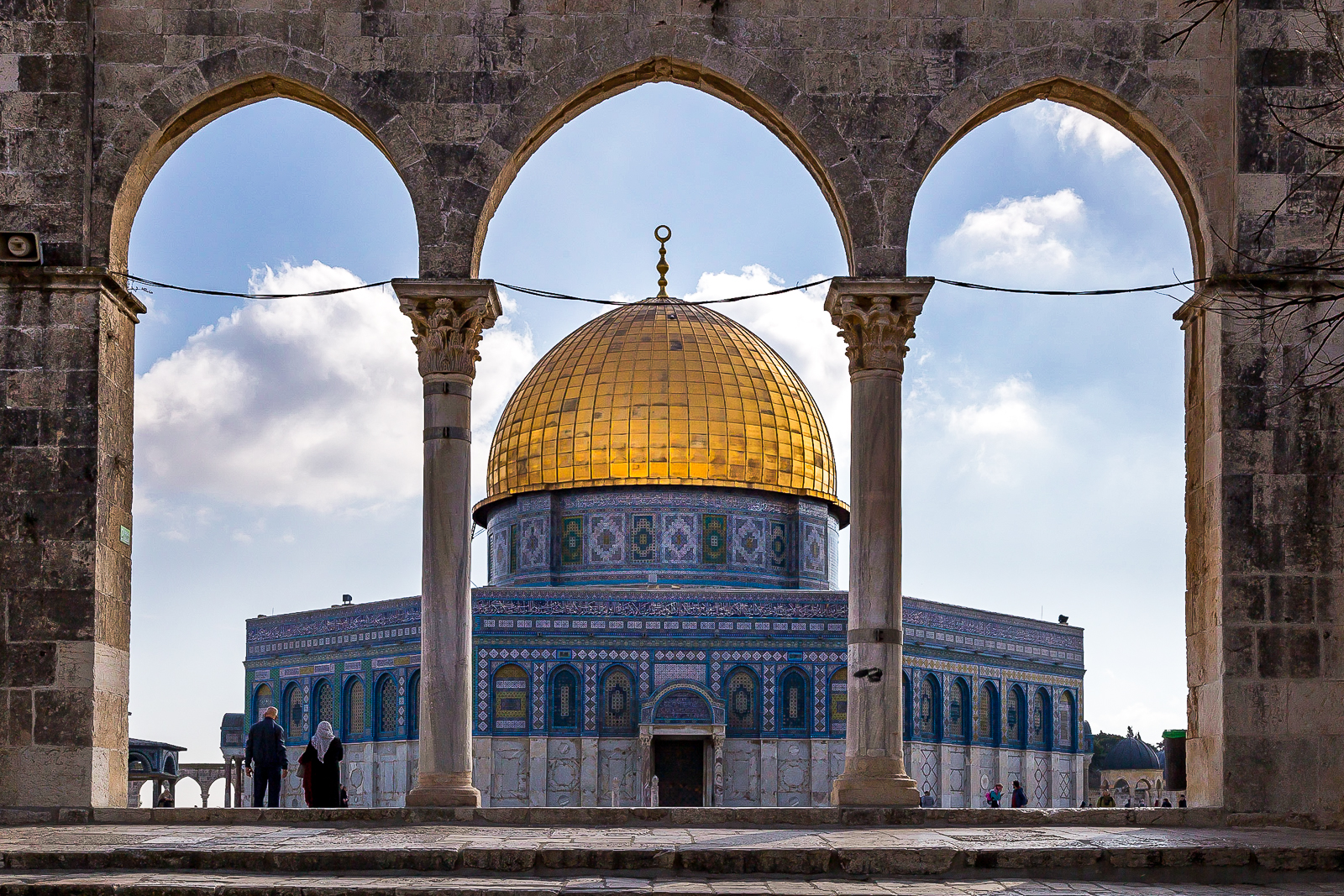It was our first time in the Middle East! To say our families were thrilled about us visiting this area of the world in the current political climate would be a complete lie. Right before we arrived, the US killed an Iranian general via air strike in Baghdad and the Iraqis vowed to retaliate on an important ally in the region – Israel. Thankfully it was all posturing (as it usually is), but we were happy to take peace. And once we got on the ground, all was well. It was a good reminder that while precaution should be taken, it’s always easy to fear from afar.
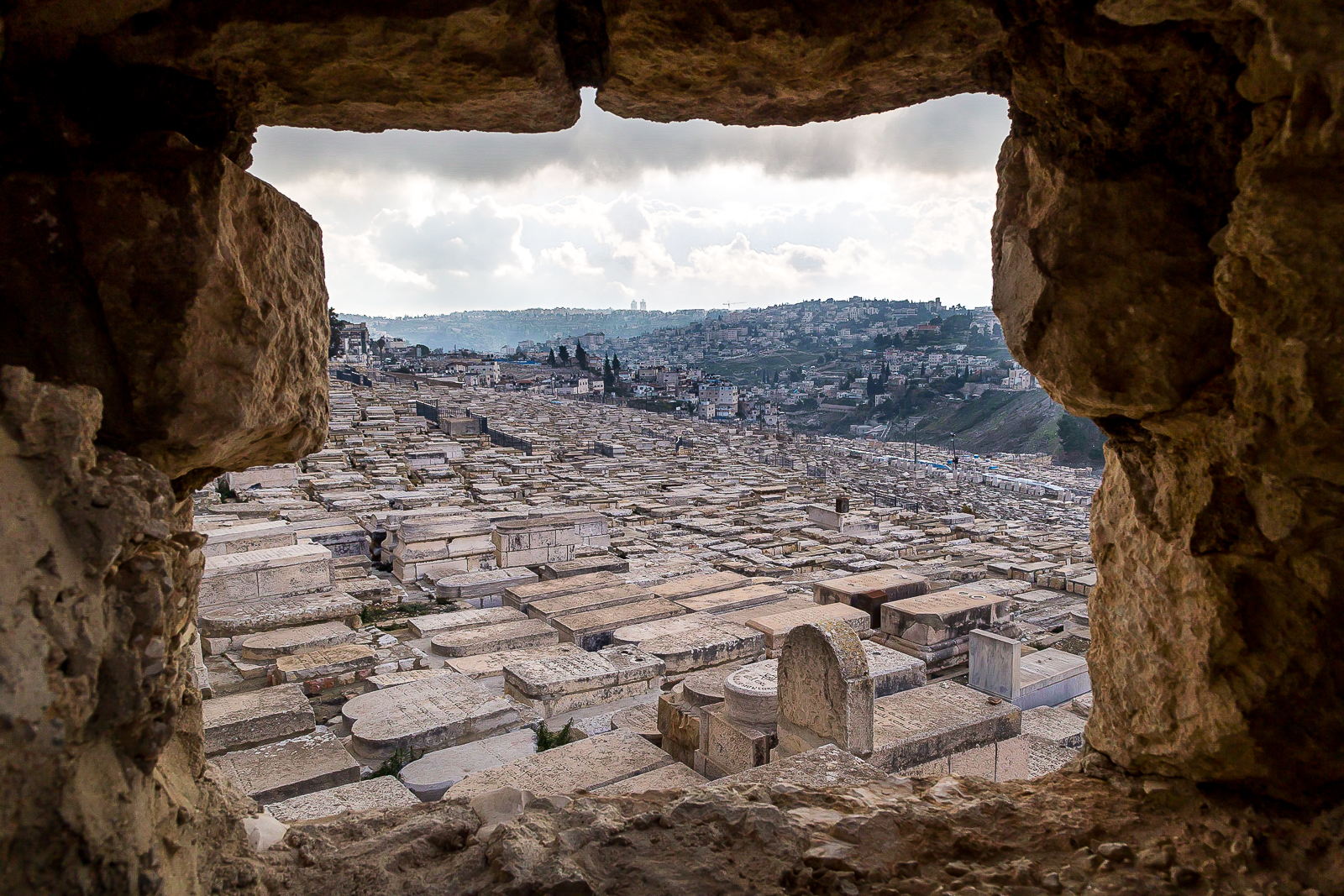
Jewish cemetery in Jerusalem
Jerusalem
There is really no place more “holy” than Jerusalem. Important to all the monotheistic religions – Judaism, Islam, and Christianity – it is the ultimate pilgrimage site. As one can imagine, this also makes Jerusalem an extremely controversial and disputed area. Both Israel and Palestine designate Jerusalem as its capital, and neither is fully internationally recognized.

Overlooking the Dome of the Rock, Jerusalem
What was the coolest part of Jerusalem for us was coming to visit as a neutral outsider, both religiously and politically. We are not of any religion, nor do we care who the land “belongs” to. That gave us the opportunity to view the city from all sides and as the sum of its parts.
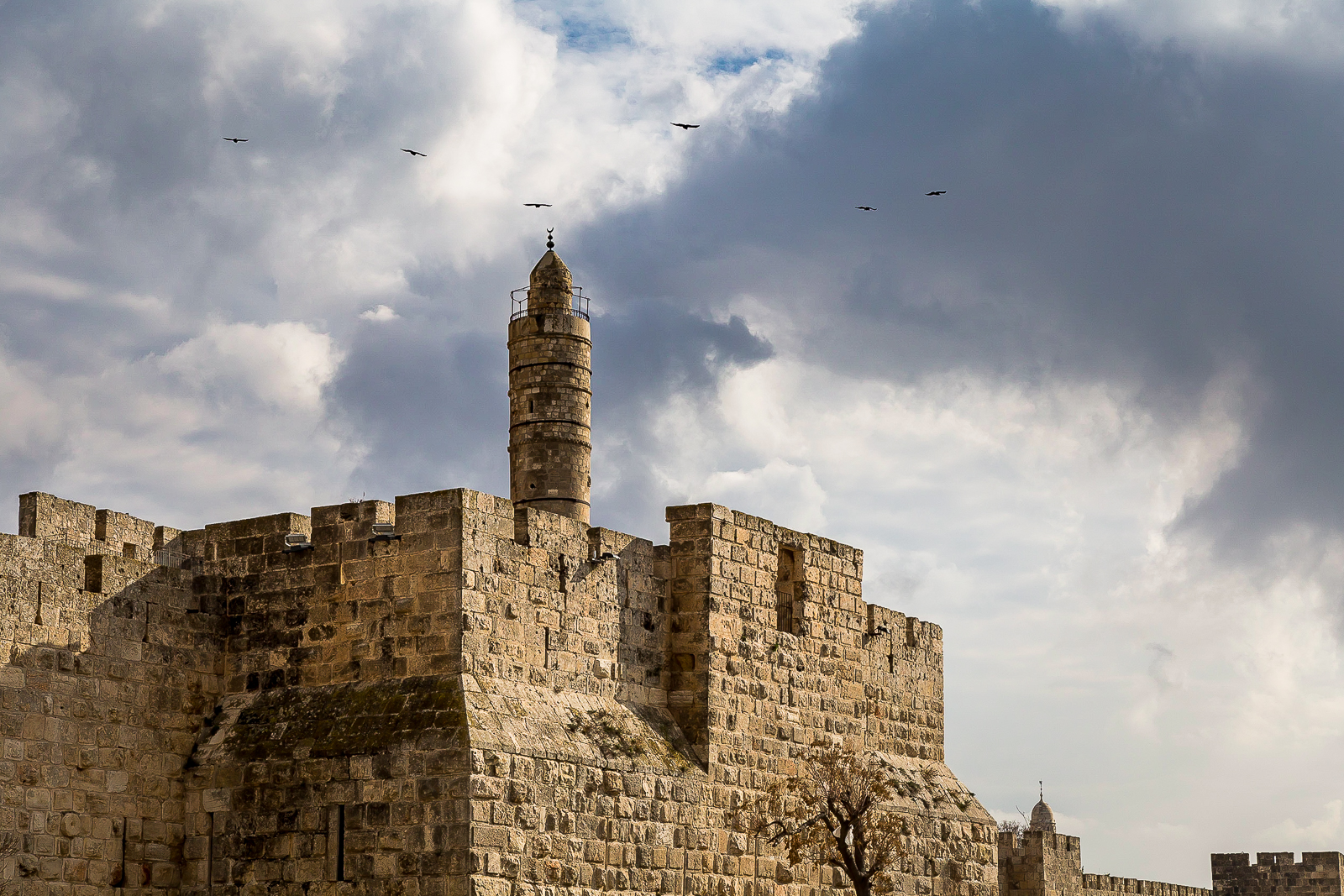
Walls of the old city of Jerusalem
Most of the important sites are in Old City Jerusalem, split into four quarters: Muslim (by far the largest), Jewish, Christian, and Armenian. Armenia was the first country to designate Christianity as the state religion, so naturally some of the inhabitants settled in the holy city. We took a Jerusalem walking tour (free with tips) because out of everywhere, this is where we wanted someone to explain the history and significance to us.
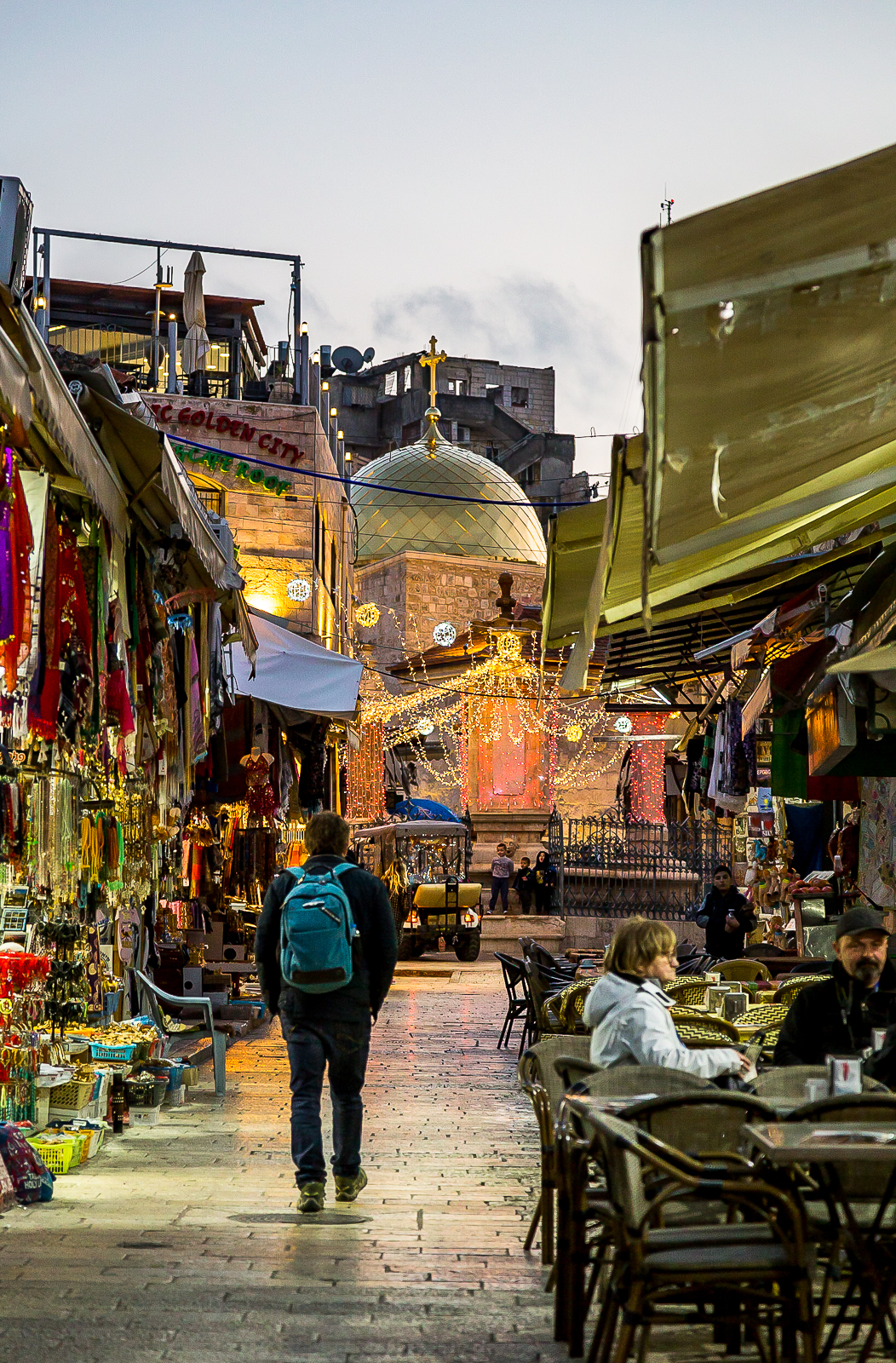
Alley in Jerusalem
The narrow streets of Jerusalem had a similar feel as the medinas in Marrakech, but all built in limestone, reminiscent of the walled city of Dubrovnik, Croatia. It was surprisingly small given the numerous significant sites within its walls. Since it’s impossible to visit all of them, here is one highlight from each religion:
Western Wall
The Western Wall is the only remaining part of the Second Temple of Jerusalem, and thus a holy site for Judaism. Here, Jews can come and pray 24/7. Besides prayer, visitors also write notes to God and place them into crevasses in the wall. One noticeable discrepancy we saw was the limited space available for women to pray vs. men. The Western Wall is also literally the western-facing wall of Mount Moriah, or what is now known as Temple Mount.

Western Wall, Jerusalem
Temple Mount
Temple Mount is an elevated, walled area within the Old City that is important to all religions but currently houses two important Islamic monuments: Dome of the Rock and Al-Aqsa Mosque. Muhammad, founder of Islam, is believed to have ascended to heaven from the Dome of the Rock site. Al-Aqsa Mosque is the third holiest site in Islam after the Kaaba in Mecca and the Prophet’s Mosque in Medina. According to Jewish trandition, the creation of the world began from the Foundation Stone inside the Dome of the Rock. Temple Mount is also an important site for Christianity.

Julie at Temple Mount, Jerusalem
Church of the Holy Sepulchre
The church is the traditional site of the crucifixion and burial of Jesus Christ. Huge lines of people waited for the chance to personally visit these exact spots. Richly decorated everywhere, the cross of Jesus can also be found here. The church is also home to the Status Quo ladder, a symbol of religious disputes within Christianity and the status quo that has been reached, where all factions of Christianity agree that no changes to the church will be made without unanimous agreement. That ladder has been in the exact same spot since the first half of the 19th century.

Rock where Jesus’ body was prepared for burial, Jerusalem
Day in and day out, people of all of these different religions live next to each other – not necessarily as friends, but as neighbors. It’s easy to notice the differences between people and what separates one group from another. What’s much harder, and what we should do instead, is celebrate the tolerance and cooperation in place that allows for a city like Jerusalem to exist. There is always more that unites us than separate us.

Tomb of Jesus Christ, Jerusalem
Tel Aviv-Yafo
Tel Aviv had a completely different feel than Jerusalem. First of all, it is indisputably Israeli. It is also a modern, secular city by the beach. Tel Aviv felt like Miami… but in the Middle East.

Overlooking Tel Aviv, Israel
We spent almost all of our time in Tel Aviv either strolling the beach or (what else?) eating. The beach goes on for miles and it was fun to see all the locals being active outdoors. We watched a lot of footvolley games (a Brazilian beach specialty of beach volleyball blended with soccer). Israeli food was similarly international and really a mix of cultures. The blend of Middle Eastern and Mediterranean created fusion food that is uniquely Israeli, like humshuka – hummus and shakshuka combined.
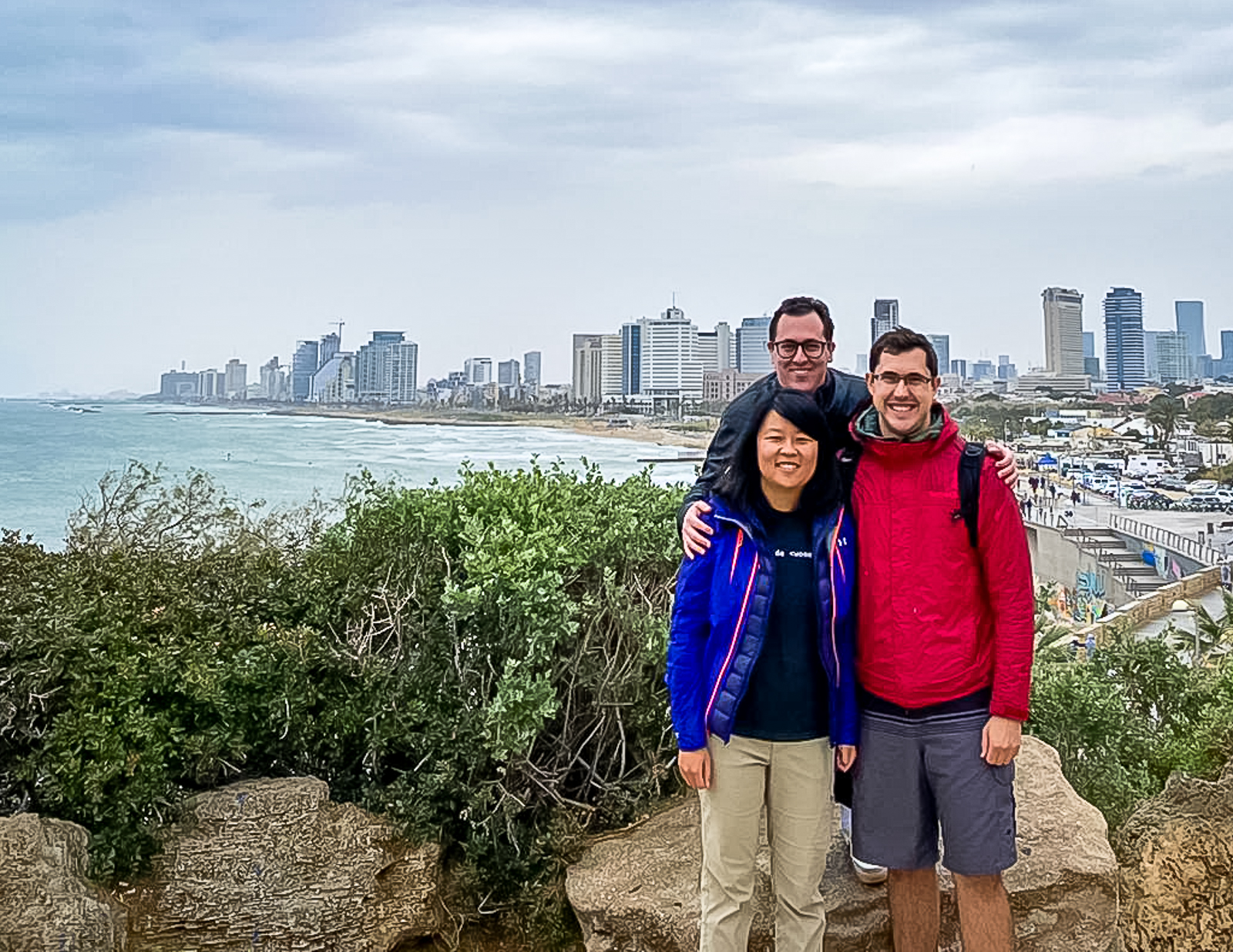
Meeting our friend Ari in Tel Aviv, Israel
It was also in Tel Aviv that we got to experience a full city shutdown during Shabbat – sunset Friday to Saturday night. In the modern technological world we live in where we’re all connected 24/7, it was amazing to see a cosmopolitan city take a break. Sometimes we think it would be nice to have something like this everywhere around the world.
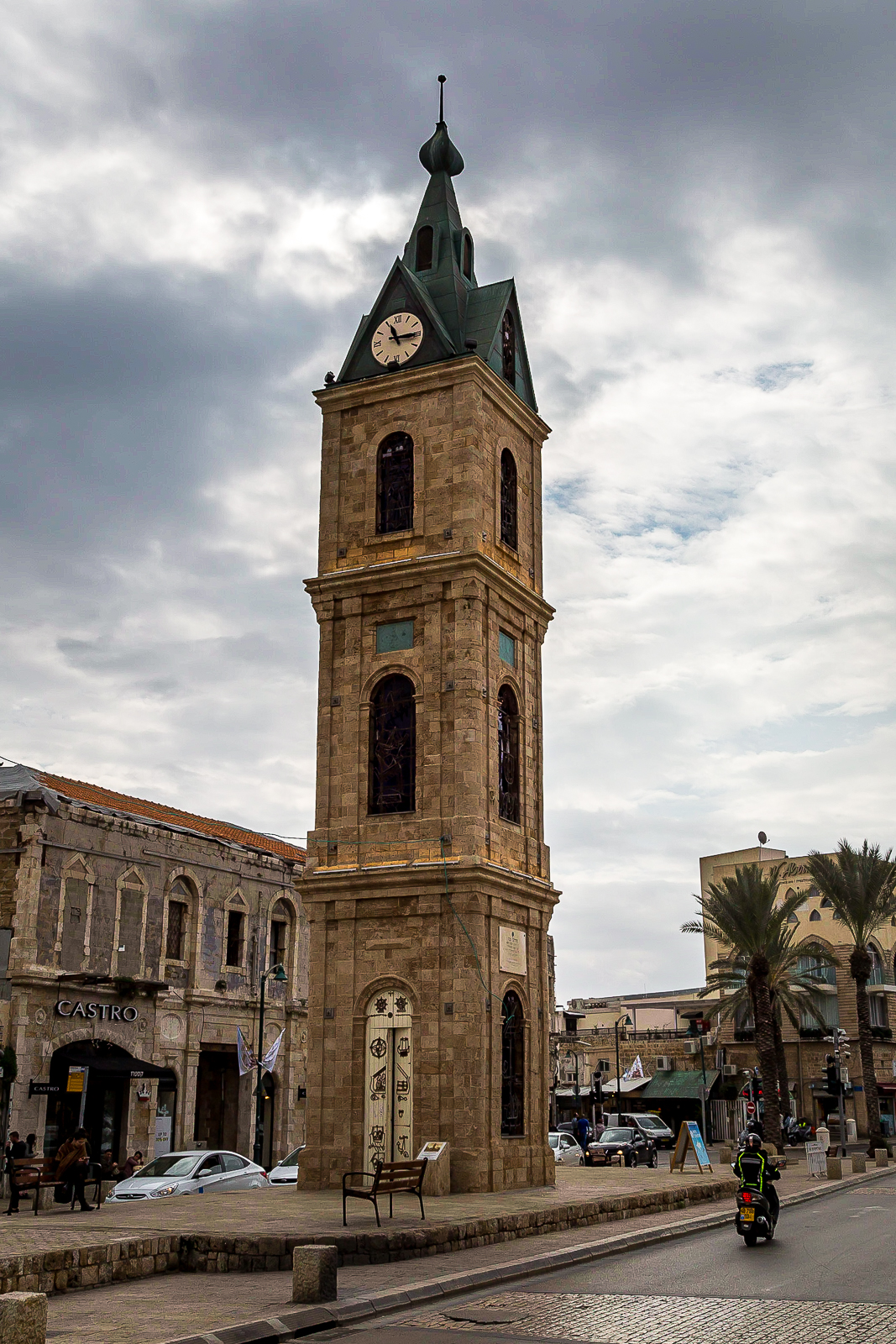
Clock tower in Old Jaffa, Tel Aviv, Israel
Just south of Tel Aviv is Old Jaffa, or what used to be the port city of Jerusalem, where people and goods arrived, then traveled to Jerusalem and entered the Old City there via the Jaffa Gate. Nowadays, Jaffa (or Yafo in Hebrew) has essentially been absorbed into Tel Aviv as the city expanded, thus the new name of Tel Aviv-Yafo. It’s an artist neighborhood with a famous flea market, reminiscent of Brooklyn in New York.
Israeli Reflections
A few more thoughts and concepts that surfaced in Israel:
- Military presence was literally everywhere. It was concerning yet also comforting. Concerning that that level of security was necessary, as if the entire country is constantly on high alert. Comforting that should something bad of any sort happen, there was always an armed soldier within reach to jump in and save the day.
- The concept of multiple truths. This was an intriguing idea and more applicable now in our globalized world than ever. Given the diversity of people and race and religions that exist in Israel and surrounding areas, it’s essentially a society of often conflicting beliefs and opinions. Thus Israelis seem to live with the idea that truth is subjective. Sometimes you just have to agree to disagree and that’s enough.

Julie and Carlos on Mount of Olives, Jerusalem
- Sometimes it seems like disputes and disagreements that exist nowadays are based on events that took place many, many years ago. We’re sure it’s complicated, but we humans sure know how to hold a grudge and teach our children to hold the same grudge. At what point is it just something that happened in the past? Easier said than done, but it’s a question nonetheless.
- Israel, more than any other place we’ve travelled to, has only reinforced the idea that borders are arbitrary lines that we have drawn to separate what we perceive to be different groups of people. The lines may represent sovereignty, nationalism, etc, but they are still arbitrary lines we made up. One can only hope that the human connection is stronger than that.
Israel was just the beginning of our adventure through the Middle East. Next up – Jordan!
